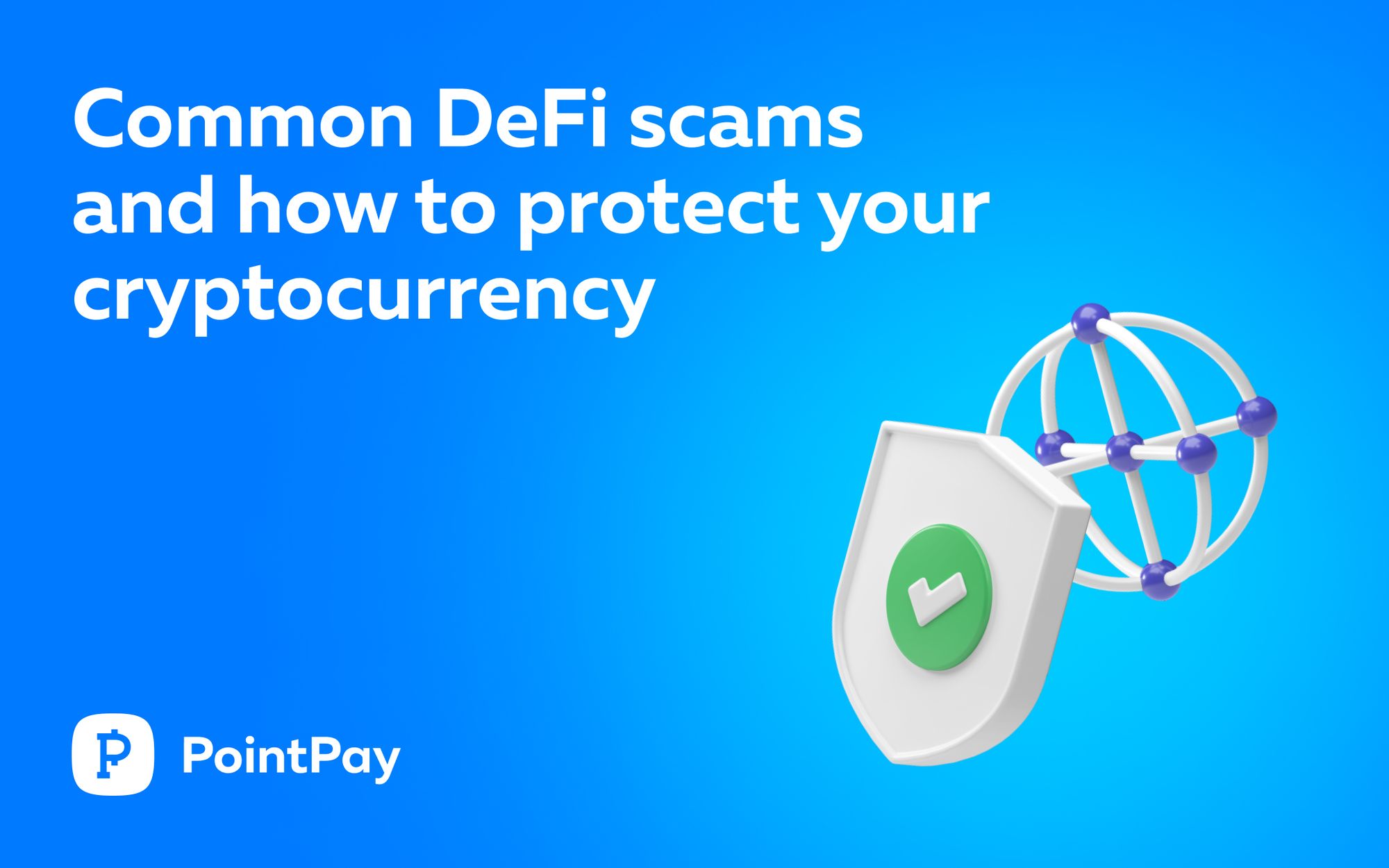2021 was a big year for the cryptocurrency market. The main and leading coins like Bitcoin and Ethereum hit all-time highs. But what do we usually get when we combine rapid growth, possibilities to make profits, and a totally unregulated market? The answer is simple: crypto scams.
And decentralized finance (DeFi) is the wild west in the crypto world. Unfortunately, DeFi scams are everywhere, so if you're thinking of starting trading, make sure you understand the risks. Today, PointPay experts want to share some information about the most common DeFi scams crypto enthusiasts and traders could fall victim to on a daily basis.
Crypto scammers love DeFi. Why?
As PointPay experts state, decentralized finance is a revolutionary next step in terms of finance. This new exciting space might offer users new ways to make profits while contributing to a large crypto community-run purpose. However, exciting DeFi innovations come with downsides — the industry is full of cryptocurrency scams and fraud for the following reasons:
- Decentralization. If you were scammed out or just sent your crypto by mistake, there is no central authority that can reverse or cancel the transaction. Unfortunately, there are no institutional or legal remedies to help you out.
- Anonymity. It is impossible to identify who stole your cryptocurrency. Even though it might be possible to trace transactions on the blockchain back to the wallet, we just can't find out who owns it.
- Irreversible transactions. There is no way to reverse or cancel a transaction. If a crypto scammer gets your sensitive data, it is impossible to change the key phrase or close your wallet. Once your Bitcoins and Ether have been withdrawn, they are gone for good.
The most common DeFi crypto scams
Rug pull & pump-and-dump crypto scams
Unfortunately, the DeFi market is full of rug pull and pump-and-dump cryptocurrency scams. How do they work? Some investors or developers hold the majority supply of a given token. With the help of Facebook, Twitter, Instagram, and Telegram, they start promoting that token and generating hype around the project.
While fraudsters make false statements and promises about a project, traders and investors take the bait and buy into the buzz. Then the token's price skyrockets and the scammers sell all their token holdings. It leads to a sharp drop in their price. In the end, investors are left with worthless tokens, and crypto scammers walk away with profits.
Phishing attacks
Phishing is a very old and the most common crypto scam. Fraudsters pretend to be media personalities or representatives from trading platforms to gather sensitive information about the users.
A DeFi phishing scam is usually conducted via email with attackers sending emails such as "Your account has been compromised. Please, send over your email address and password so we can secure it." Fraudsters can also ask to send your wallet address, passwords, private keys, and other private info.
To prevent falling for DeFi phishing scams, always double-check the contact's email address. Usually, such emails are full of random characters and typos. What is more, never click on a link in a suspicious email.
Fake Google ads
When it comes to crypto and DeFi, the first Google results mean nothing and can even direct you toward a cryptocurrency scam. Unfortunately, this search engine giant doesn't vet the authenticity and legitimacy of websites before it sells an advertisement spot.
If you're unsure about a project, check out social media pages like Twitter, Facebook, and Instagram. Here you should find the link to a real website and other helpful information. Always do your thorough research to stay safe.
Crypto scam airdrops
Airdrops are marketing stunts that involve sending tokens to wallet addresses to promote awareness of a new virtual currency. They are quite common in the crypto space. However, not all tokens airdropped to your wallet are genuine, as scammers saw a unique opportunity to steal your funds.
A DeFi scam common on the Binance Smart Chain tricked users into thinking they had suddenly received tokens. But unfortunately, they were not tradable on platforms as there was no liquidity.
Usually, such tokens are named after a shady website. If you connect your wallet through that website and approve access to a fake smart contract, fraudsters can easily steal your crypto. Be extremely cautious with airdrops scams. If it's difficult to find reliable information about a project, it's better to give it a miss.
Final thoughts
If you don't want to fall victim to a crypto scam, practice thorough due diligence and stick to reputable trading platforms like PointPay. Before investing money in a crypto project, make sure you know who the founders and developers are, who is funding the project, and what is written in its whitepaper. However, understand the risks always involved. You might still lose all the money even though you vetted the project. Ask yourself a question: "Are you ready to lose your funds even if the project seems legitimate?" If not, walk away and try traditional crypto trading on PointPay!
🔥 Buy PXP tokens on Bittrex: https://bit.ly/32VWsci
🔥 Buy PXP tokens on Bitrue: https://bit.ly/3JEreHu
🔥 Buy PXP tokens on BitHumb: https://bit.ly/3qOK6e9
🔥 Buy PXP tokens on WhiteBIT: https://bit.ly/3qJrjRH
💰 Earn up to 20% yearly with PXP staking program in PointPay Bank: https://bank.pointpay.io/staking
💡 Check PointPay Live-Roadmap (PointPay development in real-time): https://pointpay.io/live-roadmap/
🏦 Remember, we are PointPay, and we are beyond banking!
